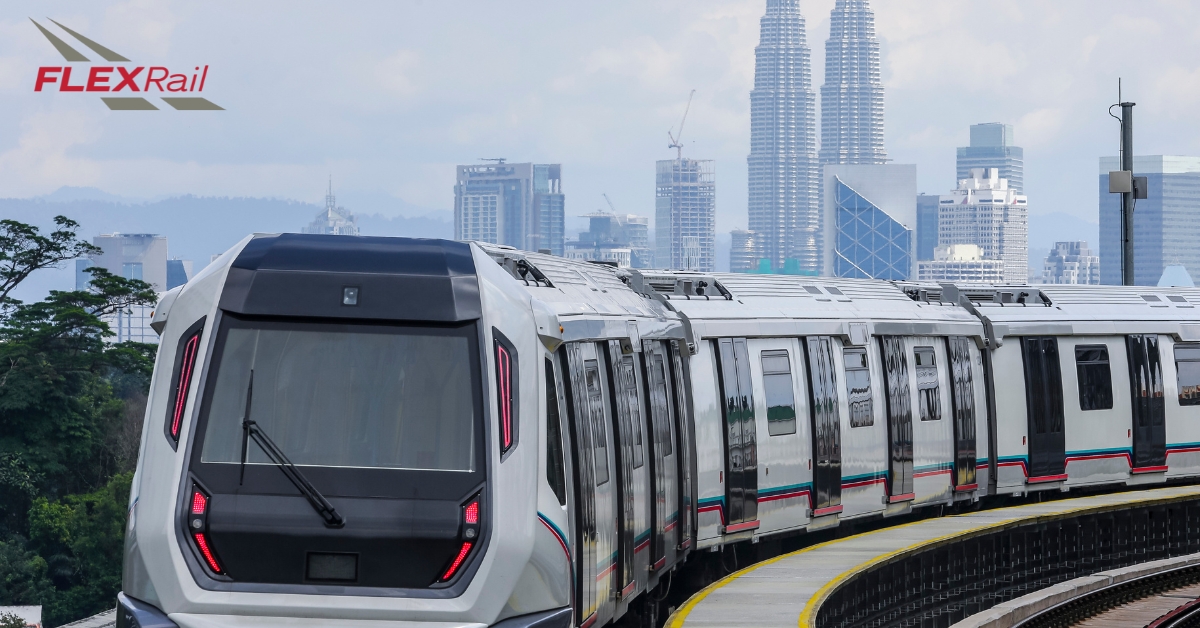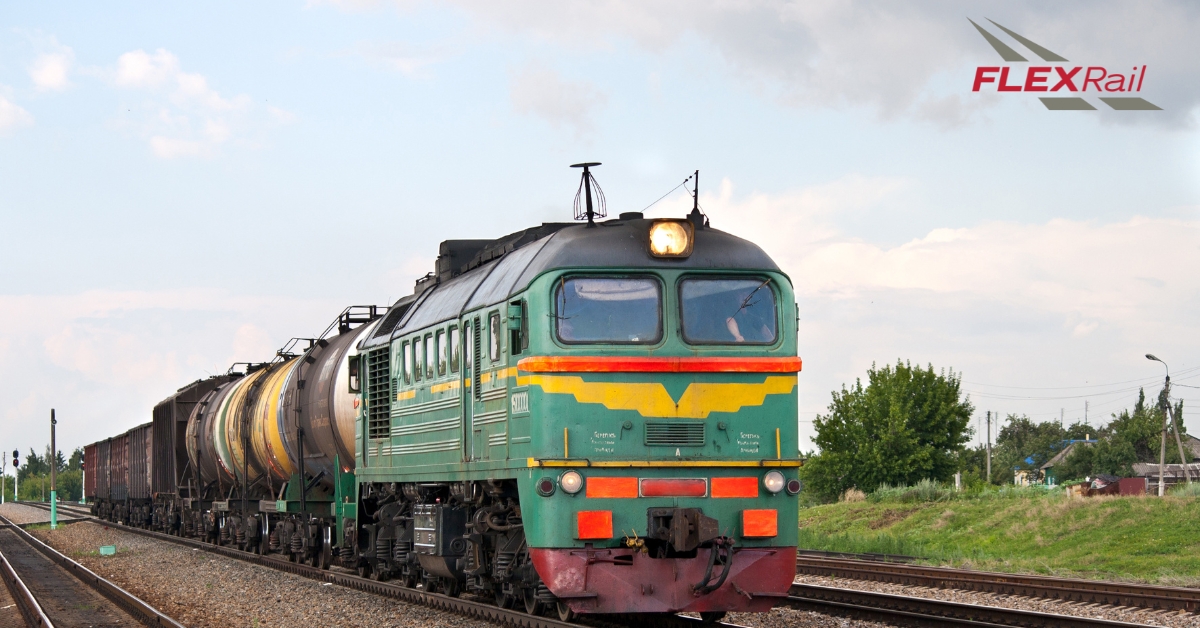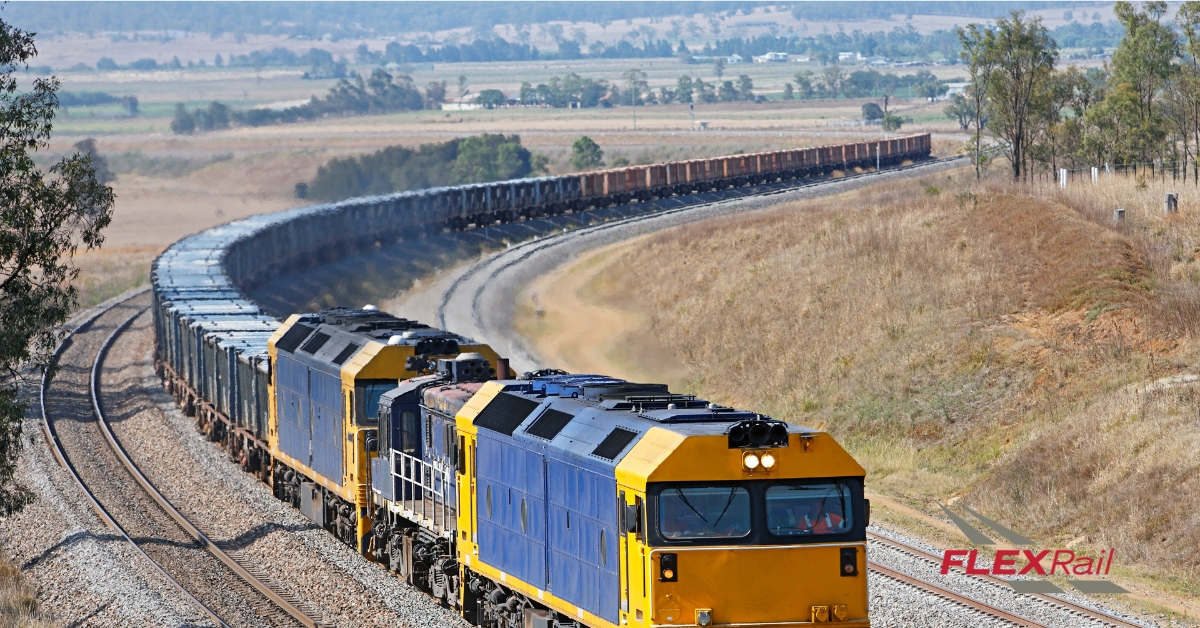FLEXRail is making big moves toward sustainability when shipping and moving goods. As the world looks for cleaner transportation options, FLEXRail is stepping up, leading the charge toward a more environmentally friendly future.
Our green initiatives make FLEXRail a key player in the pursuit of sustainable freight transportation.
FLEXRail’s Commitment to a Sustainable Future
“Our legacy as a leading transportation and logistics supplier shapes our commitment to decarbonization. FLEXRail is proud to demonstrate our carbon reduction efforts by improving operations toward zero idling, leveraging technology to reduce our carbon footprint, investing in environmentally greener equipment and adopting more efficient digital processes,” said FLEXRail’s group manager Nick Trombetta.
FLEXRail’s efforts to reduce its carbon footprint involve several sustainable freight practices that target different aspects of our operations. Below, we break down these efforts and explain how each contributes to sustainability:
Improving Operations Toward Zero Idling
Idling, especially in diesel engines used in trains and transport vehicles, consumes fuel and emits carbon dioxide, a greenhouse gas. By working towards zero idling, FLEXRail aims to minimize unnecessary fuel consumption when vehicles are not moving, thereby reducing emissions.
This is achieved through operational changes, such as better scheduling to avoid waiting times and technological solutions, like automatic engine shut-off systems.
Leveraging Technology to Reduce Carbon Footprint
Reducing carbon footprint can encompass various technologies designed to optimize fuel use, improve route planning and enhance operational efficiency.
Technologies such as GPS for optimal routing, software for better logistics management and advanced analytics for predicting and managing transport demand can significantly reduce the fuel used, thus lowering emissions.
Moreover, The Association of American Railroads reported that advanced software could improve fuel efficiency by up to 14% — proving that technology could enhance rail transport’s environmental credentials.
This software can optimize train speed, spacing and timing, ensuring trains run as efficiently as possible. Such optimizations lead to lower fuel consumption and, consequently, fewer emissions.
This application is an example of leveraging technological innovations to make green practices more achievable and impactful.
Investing in Environmentally Greener Equipment
Based on the United Nations Conference on Trade and Development report, “Challenges are both physical infrastructure deficits and lack of adequate soft infrastructure and logistics services.”
Addressing the challenges of infrastructure deficits and inadequate logistics services requires a multifaceted approach.
One effective strategy is investing in greener equipment. This involves acquiring vehicles and machinery that are more fuel-efficient and run on cleaner fuels like biodiesel or electricity.
For example, electric locomotives, which emit zero emissions at the point of use, exemplify this shift towards sustainability.
By adopting environmentally friendly equipment, companies can significantly reduce their carbon footprint, thereby supporting a broader transition towards a low-carbon economy.
Adopting More Efficient Digital Processes
Digitalization can streamline many aspects of transportation and logistics, from inventory management to customer communications.
By adopting digital processes, FLEXRail can reduce the need for paper-based systems, improve the efficiency of operations (reducing waste and energy use) and enable more precise tracking and optimization of shipments. This optimization leads to fewer unnecessary journeys, reduced energy consumption and lower emissions.
Each of these efforts contributes to sustainability by directly reducing the amount of greenhouse gases emitted into the atmosphere or improving operational efficiency, which indirectly leads to lower emissions.
By focusing on these areas, FLEXRail demonstrates a comprehensive approach to decarbonization that aligns with global efforts to combat climate change and promote environmental sustainability.
Innovative Solutions for Greener Transportation
Our approach to reducing environmental impact revolves around adopting and exploring cutting-edge technologies and fuels that are kinder to our planet. By investigating and utilizing electric and biodiesel options for our motive power needs, we are at the forefront of a significant shift in the industry.
Electric locomotives run on electricity, which can be generated from renewable sources, drastically reducing greenhouse gas emissions and pollutants compared to traditional diesel engines. This innovative solution aligns with global efforts to mitigate climate change by lowering reliance on fossil fuels.
The introduction of the Shuttlewagon, a versatile piece of equipment in our operational fleet, underscores FLEXRail’s dedication to practical and immediate solutions for energy conservation.
The Shuttlewagon’s ability to be shut off in cold temperatures — a time when vehicles are typically left idling to prevent engine freezing — showcases a thoughtful approach to reducing unnecessary fuel consumption and emissions.
This capability is particularly significant in rail and freight operations, where idling is a common practice for maintaining machinery readiness but is also a source of considerable energy waste and environmental pollution.
FLEXRail’s commitment to innovation and environmental stewardship is evident in the ways we are rethinking and reshaping our operations to be more sustainable, setting a benchmark for the industry.
Through these efforts, we demonstrate that environmental responsibility and business success can go hand in hand.
The Role of Rail in Reducing Carbon Emissions
The environmental advantages of choosing rail over road for freight transport are compelling and multifaceted.
Rail transport’s efficiency comes from its ability to move a large volume of goods over long distances with significantly less fuel per ton-mile than road vehicles. This inherent efficiency substantially reduces greenhouse gas emissions, a critical factor in combating climate change.
According to the Association of American Railroads, “Freight railroads are the most fuel-efficient way to move goods over land, transporting one ton of freight nearly 500 miles on a gallon of fuel.”
FLEXRail showcases the vast potential of rail transport as a cornerstone of sustainable freight movement. The company contributes to a more significant shift toward sustainability in the logistics sector by adopting and further developing these technologies and practices.
This shift is crucial for reducing the environmental footprint of freight transport and building a more sustainable economy that balances growth with ecological responsibility.
In this light, FLEXRail’s efforts and the broader move towards more efficient and less polluting rail transport are crucial to achieving a sustainable future.
FLEXRail Leading the Charge in Sustainable Freight
According to Forbes, “The logistics sector stands at a pivotal junction, facing a now-or-never moment. With rising sustainability pressures and radical technological shifts, businesses must transform operations to meet stringent emissions regulations and growing customer expectations around eco-friendly deliveries.”
Forbes highlighted that sustainability in logistics is imperative — and FLEXRail is at the vanguard of the sustainability movement.
Our practices are not only in line with global sustainability efforts but are also paving the way for zero-carbon shipping by 2050.
FLEXRail’s proactive approach to adopting sustainable practices sets a benchmark for the industry, signaling a shift towards more environmentally responsible freight transport.
Encouraging Sustainable Shipping Practices
The future growth of the freight rail industry hinges on adopting sustainable practices. FLEXRail champions this transformation, urging businesses to discover how integrating efficient rail transport, flexible last-mile trucking and versatile storage solutions can revolutionize logistics.
This strategy supports shifting towards a more sustainable and efficient freight transportation system.
The same Forbes article on sustainability also advised, “Attempting complex technology changes without professional guidance can lead to inefficient resource use and inconsistent progress. However, you don’t have to maintain your IT department; an experienced software company can handle all the necessary operations for you.”
AutoVentive, FLEXRail’s sister company, is a shining example of how FLEXRail is extending its commitment to sustainability beyond traditional rail logistics, embracing technological innovation to streamline and green the supply chain.
By harnessing the power of AutoVentive’s Yard Management System (YMS), we’re not just making strides in reducing our carbon footprint but also offering our clients the tools they need to do the same.
This cloud-based solution optimizes the flow of goods through the yard, significantly reducing idle times and unnecessary fuel consumption of trucks waiting to load or unload.
The visibility and analytics provided by the system allow for more efficient scheduling and resource use, which minimizes the environmental impact of shipping operations.
FLEXRail’s path towards sustainability extends beyond implementing green initiatives; it’s about setting new standards in transforming the transportation sector for the greater good.
Our commitment to lowering carbon footprints and advocating for environmentally friendly options places FLEXRail at the forefront of the movement toward a sustainable future in freight transportation.
Discover the Future of Rail Logistics with FLEXRail
As a leader in rail logistics solutions, FLEXRail brings more than 40 years of expertise to the forefront of sustainable transportation. Serving clients across every major industry, we’ve mastered the art of enhancing rail transportation effectiveness for various commodities.
Led by an experienced team of rail transportation, yard management and logistics experts from companies including Autoport, AWC, Canadian National Railway, Illinois Central and the Belt Railway of Chicago, FLEXRail provides you with unparalleled expertise and operational excellence in all phases of your supply chain management process.
Our comprehensive suite of services, from logistics and terminal operations to transloading solutions, is designed to cater specifically to your unique transportation requirements.
Let us help you navigate the complexities of rail logistics with our tailored, eco-friendly solutions.




0 Comments